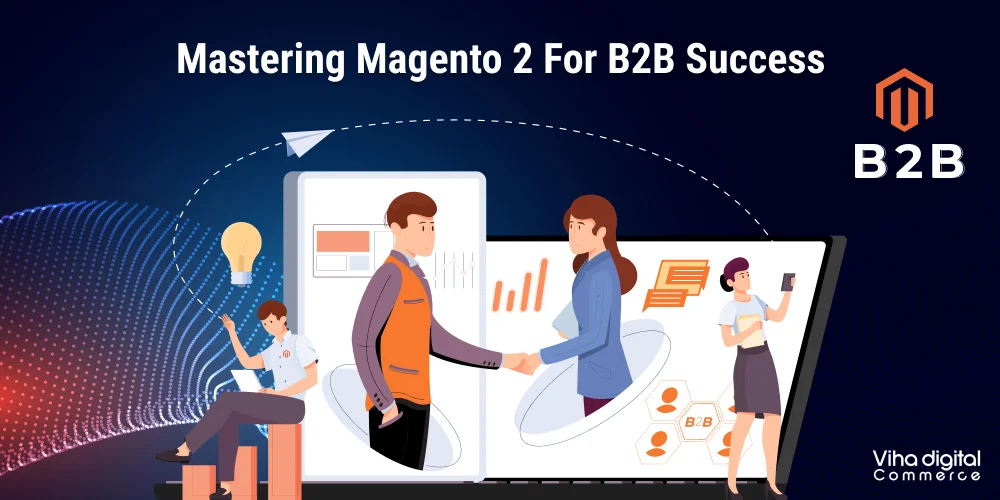
Unlocking the Potential of Magento 2 B2B: A Comprehensive Guide
In the world of B2B e-commerce, having a robust, flexible, and scalable platform is crucial. Magento 2 stands out as a powerful solution designed to meet the unique demands of B2B transactions. This comprehensive guide will explore Magento 2 B2B features, discuss the advantages of using Magento over other B2B e-commerce platforms like Shopify and WordPress, and highlight key strategies for implementing successful B2B e-commerce solutions.
Why Choose Magento 2 for B2B E-commerce?
Magento 2 is a leading e-commerce platform known for its flexibility, customization, and scalability. These attributes make it particularly suitable for B2B e-commerce, where businesses often require complex functionalities and integrations.
Key Benefits of Magento 2 B2B:
- Advanced Customization: Magento 2 offers extensive customization options, allowing businesses to tailor their e-commerce solutions to their specific needs.
- Scalability: As your business grows, Magento 2 can scale with you, handling large volumes of transactions and extensive product catalogs.
- Integration Capabilities: Magento 2 seamlessly integrates with various third-party systems, including ERP, CRM, and PIM, enhancing operational efficiency.
- Security: Robust security features ensure that your data and transactions are protected.
Comparing B2B E-commerce Platforms: Magento, Shopify, WordPress
When choosing a B2B e-commerce platform, it’s essential to compare the key players: Magento, Shopify, and WordPress.
Magento 2
– Pros: High customization, scalability, robust B2B features, strong integration capabilities.
– Cons: Requires more technical expertise, higher initial setup costs.
Shopify
– Pros: User-friendly, quick setup, excellent customer support, and app ecosystem.
– Cons: Limited customization for complex B2B needs, higher transaction fees, and reliance on third-party apps for advanced features.
WordPress (Woo Commerce)
– Pros: Cost-effective, easy to use, extensive plugin ecosystem, and content management capabilities.
– Cons: Requires multiple plugins for B2B features, potential performance issues with large catalogs, and less scalability than Magento.
Key Magento 2 B2B Features
Magento 2 offers a range of features specifically designed to enhance B2B operations:
Custom Pricing and Quoting
Magento 2 B2B allows businesses to offer custom pricing and quoting options. This feature is particularly beneficial for B2B transactions, where prices often vary based on the client or order volume.
– Magento 2 B2B Pricing: Businesses can set tiered pricing, customer-specific pricing, and bulk discounts. This flexibility helps in catering to different customer segments effectively.
– Quote Management: Customers can request quotes directly from the website, and businesses can respond with tailored pricing. This streamlines the negotiation process and enhances customer satisfaction.
Corporate Account Management
Magento 2 enables the creation and management of corporate accounts, allowing businesses to manage multiple buyers and roles within a single organization.
– Account Roles and Permissions: Assign different roles and permissions to users within the same corporate account, ensuring that only authorized personnel can place orders or manage account settings.
– Order Approval Workflow: Implement order approval workflows to ensure that all purchases meet the company’s procurement policies.
Advanced Inventory Management
Effective inventory management is crucial for B2B operations. Magento 2 provides robust inventory management features that ensure products are always available when needed.
– Multi-Source Inventory (MSI): Manage inventory across multiple warehouses and sales channels, optimizing stock levels and reducing carrying costs.
– Real-Time Inventory Updates: Keep your inventory data accurate with real-time updates, preventing overselling and stockouts.
Seamless Integration
Integrating your e-commerce platform with existing business systems is essential for smooth operations.
– ERP and CRM Integration: Connect Magento 2 with your ERP and CRM systems to synchronize data and streamline workflows.
– API Integration: Magento 2’s API-first architecture allows easy integration with third-party applications, ensuring that your e-commerce platform can adapt to changing business needs.
Leveraging Magento 2 B2B Extensions
Magento 2 B2B extensions further enhance the platform’s capabilities, providing additional functionalities tailored to B2B needs.
Top Magento 2 B2B Extensions:
- Customer Specific Pricing: Customize prices for different customer groups, ensuring that each client receives the correct pricing based on their contract.
- Quick Order: Allow customers to quickly add multiple products to their cart using SKU numbers, speeding up the purchasing process for repeat orders.
- Sales Reps and Dealers: Manage sales representatives and their assigned accounts, enabling better customer relationship management and sales tracking.
Implementing a Successful B2B E-commerce Strategy
A successful B2B e-commerce strategy involves more than just choosing the right platform. Here are key elements to consider:
Understand Your Customers
Knowing your customers’ needs, preferences, and purchasing behaviors is crucial for tailoring your e-commerce solutions.
– Customer Segmentation: Segment your customers based on industry, size, and purchasing behavior to offer personalized experiences.
– Customer Feedback: Regularly gather feedback to understand pain points and areas for improvement.
Optimize User Experience
A seamless user experience is vital for retaining customers and driving sales.
– Responsive Design: Ensure your website is mobile-friendly, as many B2B buyers use mobile devices for research and purchasing.
– User-Friendly Interface: Simplify navigation and make it easy for customers to find products, place orders, and manage their accounts.
Invest in Marketing and Sales Automation
Marketing and sales automation tools can help you reach your target audience more effectively and streamline sales processes.
– Email Marketing: Use automated email campaigns to nurture leads, promote products, and offer personalized recommendations.
– CRM Integration: Integrate your CRM with Magento 2 to automate sales processes and improve customer relationship management.
Monitor and Analyze Performance
Regularly monitoring and analyzing your e-commerce performance helps you identify areas for improvement and optimize your strategy.
– Analytics Tools: Use analytics tools to track key performance indicators (KPIs) such as conversion rates, average order value, and customer retention.
– A/B Testing: Conduct A/B testing to determine the most effective strategies for website design, pricing, and promotions.
Conclusion
Magento 2 B2B offers a comprehensive and powerful solution for businesses looking to enhance their B2B e-commerce operations. With advanced features, extensive customization options, and robust integration capabilities, Magento 2 stands out as a leading B2B e-commerce platform. By leveraging Magento 2 B2B extensions and implementing a well-rounded e-commerce strategy, businesses can unlock new opportunities for growth and success.
Investing in Magento 2 development and utilizing professional Magento Development Services can further ensure that your B2B e-commerce platform is optimized for performance, scalability, and customer satisfaction. With the right tools and strategies, you can transform your B2B e-commerce operations and drive substantial revenue growth.





